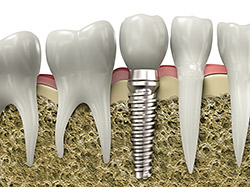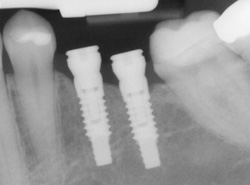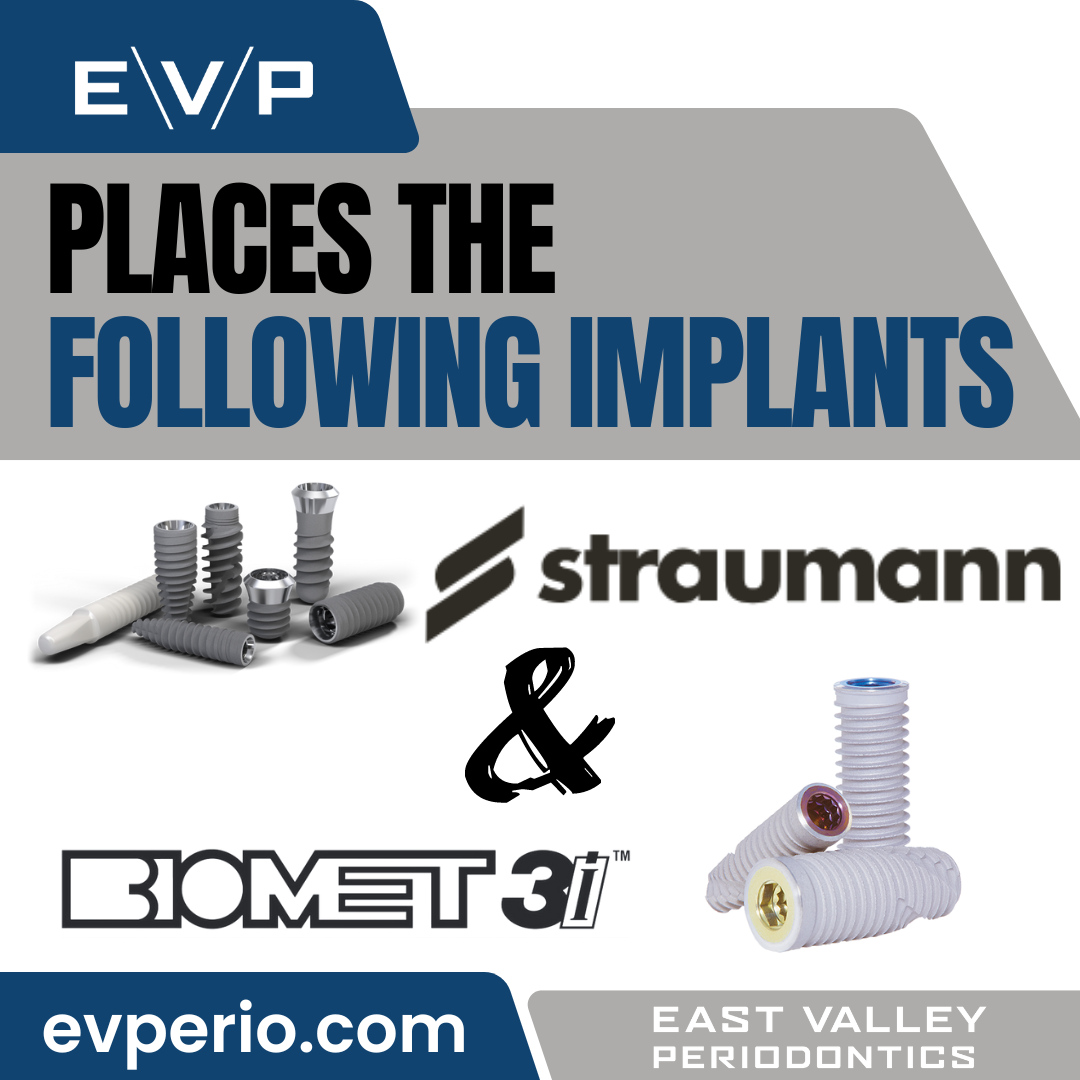Dental Implants
People are living longer than ever, and while regular brushing, flossing, and checkups allow many of us to maintain our natural smiles for a lifetime, sometimes our teeth just can't keep up. If you've lost a tooth (or a few teeth) due to injury or disease, dental implants can rejuvenate both your smile and your oral health.
An implant is a synthetic tooth root in the shape of a post that is surgically placed into the jawbone. The “root” is usually made of titanium: the same material used in many replacement hips and knees, and a metal that is well-suited to pairing with human bone. A replacement tooth is then fixed to the post. The tooth can be either permanently attached or removable. Permanent teeth are more stable and feel more like natural teeth.
The ideal candidate for implants is a non-smoker who has good oral health, including a sufficient amount of bone in the jaw, and healthy gums with no sign of gum disease.
Single or Multiple Implants

Implants are versatile. If you are only missing one tooth, one implant plus one replacement tooth will do the trick. If you are missing several teeth in a row, a few strategically placed implants can support a permanent bridge (a set of replacement teeth). Similarly, if you have lost all of your teeth, a full bridge or full denture can be permanently fixed in your mouth with a strategic number of implants.
Advantages Over Dentures or Bridges
Conventional bridges and dentures are not fixed to the bone, and can therefore be unstable. This can make it difficult to eat or smile with confidence. Implants not only look more natural, but feel and act more like normal teeth, with a stronger biting force. And because they don't directly rely on neighboring teeth for support, implants don't compromise the health of your natural teeth. In fact, bridges are only expected to last seven to ten years, even less with root canals, whereas implants will typically last a lifetime.

Post-Treatment Care
Consider your replacement teeth to be the same as natural teeth. They require the same daily brushing and flossing, and the same amount of regular checkups. Just like your natural teeth, the better you take care of your replacements, the longer they will last.
Implant Services

Our implant services include:
- Sinus Lift Augmentation: Often the sinuses will enlarge following loss of the upper back teeth. This can preclude placement of dental implants in the upper back areas of the mouth, since the sinus is an air-filled space and dental implants need to be surrounded by solid bone. A sinus lift augmentation/graft is a surgical procedure that restores the sinus cavity to its original size, and replaces the bone that has been lost as a result of the enlarged sinus. This new bone graft typically takes nine to 12 months to heal before the dental implants can be placed into the grafted bone.
- Autogenous Bone Grafting: Occasionally, the ideal areas for dental implants do not have sufficient bone quantity to support the implants. In these cases, it is often necessary to “borrow” bone from another area of your mouth and graft it into the deficient area. Often, the area of choice is from the chin or in the back of the jaw where your wisdom teeth used to be.
- Implant Site Development: When a tooth needs to be removed due to infection, it is not uncommon to have lost bone around the infected tooth. In these cases, various types of bone grafting can be done at the same time the tooth is removed to facilitate the placement of a dental implant at a later date.
- Computer-Enhanced Treatment Planning: We have special software on our computer that allows us to evaluate your dental CT scan in three dimensions for bone quality, bone quantity, and bone location, enabling the best possible placement of your dental implants. This also allows us to work closely and smoothly with your restorative dentist to ensure an ideal result where your dental implants are concerned.
- Implant Maintenance: Once your dental implant restoration is completed, it is important to keep the area clean and infection-free. Dental implants can accumulate plaque and tartar just as teeth can. Whether you have just one tooth replaced by an implant or several, a professional cleaning schedule will be necessary to keep your implants healthy. The time interval for these professional cleanings will be determined by your individual needs.
Our goal here at East Valley Periodontics is always first and foremost to save teeth. However, there can come a time when saving the teeth is no longer an option. If that is the case for you, don’t worry, there are options for full arch tooth replacement that are functional and comfortable and beautiful.
What is a Hybrid Prosthesis?
A hybrid prosthesis is a dental bridge that is supported by 4-6 implants. It is an excellent alternative to conventional dentures because of the beautiful aesthetics and the functionality. It allows people to go through their lives and eat, smile and enjoy their life as normal without the hassle and ill-fit of a conventional denture.
Because the bridge is placed with an even load on the implants, most of the time we can remove the teeth, place the implants and the temporary prosthesis all in the same day. You walk out of our office with a screw retained provisional (temporary) prosthesis that looks beautiful!
After 4-6 months of healing you will see your general dentist to have the permanent implant supported bridge made. At this stage careful attention is paid to aesthetics, strength and comfortable fit since this will be your permanent prosthesis.
Advantages of the Hybrid Bridge vs. Conventional Dentures:
One of the biggest advantages to having an upper hybrid vs. a conventional denture is that with the hybrid your palate does not have to be covered. Because a conventional denture relies on palatal suction to hold it is place, the full palate has to be covered. When your palate is covered you lose 50-80% of your ability to taste food. You also have the problem of loose fit and food trapping under a conventional denture.
Lower dentures will over time “float” in the mouth because once teeth are removed, the lower bony ridge that held in the teeth tends to flatten over time leaving nothing for the lower denture to sit on. With a hybrid, the prosthesis is screwed into the implants holding it is place and, the implants maintain the bone levels like natural teeth.
A hybrid denture is held in place by implants which alleviates the need for palatal coverage. The upper denture is cut like a horseshoe. Since your whole palate is exposed, loss of taste is not an issue. Also, because you don’t have the possibility of the prosthesis “rocking” like conventional dentures tend to do, chewing is much easier.
Hybrid prostheses are screwed in place. This means that when you are eating, you don’t have the possible embarrassment of your denture falling out or the possible discomfort of having food stuck under your denture. You do not remove a hybrid to clean under it. For surface cleaning, you simply brush it like you would your natural teeth. Cleaning underneath the hybrid is easy using special dental brushes which can be purchased here or at any pharmacy and a Waterpik™ which is included in the cost for your hybrid.
Are there any drawbacks to implant and hybrid placement?
Overall, any drawbacks to implant and hybrid placement are minimal.
In the US implants in general have a very low failure rate of 3-5%. Most of the time a failed implant can be replaced and generally it will not fail a second time.
**Note: Smoking greatly decreases the success rate of a hybrid and implants in general and, smoking voids any warranty**
Is implant and hybrid placement painful?
Most of the time patients tell us that the pain with this type of procedure was very minimal. Generally, within a few days of having the surgery, any pain that you may have is gone and you are enjoying the new found freedom from the previous pain of failing natural teeth, inflammation and infection and the hassle of trying to eat with missing or broken teeth. Most often people tell us that they wish that they had done it much sooner because they are ecstatic with the results!
Who can benefit from a hybrid?
Anyone of any age that has lost teeth due to accidents, mouth related disease, severe cavities, or periodontal disease. There are occasions where due to severe bone loss or a patient’s anatomy more extensive work has to be done in order to accommodate the hybrid but in most cases, it is very doable.
What can I expect long-term with a hybrid prosthesis?
As mentioned before having a hybrid is much like having natural teeth. They must be maintained with excellent home care and regular dental cleanings every 3-6 months. Once every 12-24 months or so the hybrid is removed by your dentist and the implants and bridge thoroughly cleaned underneath and then replaced. The cost for regular maintenance is not included in the initial cost for the surgery and the temporary and permanent prostheses.
Occasionally a tooth will break and have to be repaired and over a long period of time, the teeth in the prostheses could wear down and have to be replaced.
Are hybrids affordable?
Although hybrids are one of the more costly solutions, we work with our patients to help find a way to afford it. We offer no interest financing for up to 2 years to those who qualify or it can be spread out over up to 6 years with interest bearing financing. We also offer a cash discount for those who are able to pay it in cash. We have been successful in helping many of our patients find a solution to the cost.
Hybrids are a beautiful way to restore your smile and dental functionality. Invariably our patients who have had a hybrid placed are extremely happy and wish they had done it much sooner.



 Website Powered by Sesame 24-7™
Website Powered by Sesame 24-7™